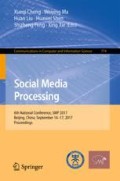Abstract
Sentiment regression is a task of summarizing the overall sentiment of a review with a real-valued score. However, the regression model trained in one domain probably performs poorly in a different domain due to the distribution variety. Different from existing studies, domain adaptation in sentiment regression is more challenging because the rating range in one domain might be different from that in the other domain. In this study, we propose a novel approach to domain adaptation for sentiment regression. Specifically, our approach employs an auxiliary Long Short-Term Memory (LSTM) layer to learn the auxiliary representation from the source domain, and simultaneously join the auxiliary representation into the main LSTM layer for the target domain regression setting. In the learning process, the LSTM regression models for the source and target domains are jointly learned. Empirical studies demonstrate that our joint learning approach performs significantly better than several strong baselines.
Access this chapter
Tax calculation will be finalised at checkout
Purchases are for personal use only
References
Pang, B., Lee, L.: Opinion mining and sentiment analysis. Found. Trends Inf. Retreival 2, 1–135 (2008)
Paltoglou, G., Thelwall, M.: A study of information retrieval weighting schemes for sentiment analysis. In: Proceedings of the 48th Annual Meeting of the Association for Computational Linguistics, pp. 1386–1395. Association for Computational Linguistics (2010)
Qiu, G., He, X., Zhang, F., et al.: DASA: dissatisfaction-oriented advertising based on sentiment analysis. Expert Syst. Appl. 37(9), 6182–6191 (2010)
Yang, D., Zhang, D., Yu, Z., et al.: A sentiment-enhanced personalized location recommendation system. In Proceedings of the 24th ACM Conference on Hypertext and Social Media, pp. 119–128. ACM (2013)
Blitzer, J., Dredze, M., Pereira, F.: Biographies, bollywood, boom-boxes and blenders: domain adaptation for sentiment classification.ACL 7, 440–447 (2007)
Daumé III, H.: Frustratingly easy domain adaptation. arXiv preprint arXiv:0907.1815 (2009)
Bahdanau D, Cho K, Bengio Y. Neural machine translation by jointly learning to align and translate. arXiv preprint arXiv:1409.0473 (2014)
Iyyer, M., Boyd-Graber, J.L., Claudino, L.M.B., et al.: A neural network for factoid question answering over paragraphs. In: EMNLP, pp. 633–644 (2014)
Hochreiter, S., Schmidhuber, J.: Long short-term memory. Neural Comput. 9(8), 1735–1780 (1997)
Pang, B., Lee, L.: Seeing stars: exploiting class relationships for sentiment categorization with respect to rating scales. In: Proceedings of the 43rd Annual Meeting on Association for Computational Linguistics, pp. 115–124. Association for Computational Linguistics (2005)
Tan, S., Cheng, X.: Improving SCL model for sentiment-transfer learning. In: Proceedings of Human Language Technologies: The 2009 Annual Conference of the North American Chapter of the Association for Computational Linguistics, Companion Volume: Short Papers, pp. 181–184. Association for Computational Linguistics (2009)
Tan, S., Cheng, X., Wang, Y., Xu, H.: Adapting Naive Bayes to domain adaptation for sentiment analysis. In: Boughanem, M., Berrut, C., Mothe, J., Soule-Dupuy, C. (eds.) ECIR 2009. LNCS, vol. 5478, pp. 337–349. Springer, Heidelberg (2009). doi:10.1007/978-3-642-00958-7_31
Graves, A.: Generating sequences with recurrent neural networks. arXiv preprint arXiv:1308.0850 (2013)
Hinton, G.E., Srivastava, N., Krizhevsky, A., et al.: Improving neural networks by preventing co-adaptation of feature detectors. arXiv preprint arXiv:1207.0580 (2012)
McAuley, J., Pandey, R., Leskovec, J.: Inferring networks of substitutable and complementary products. In: Proceedings of the 21st ACM SIGKDD International Conference on Knowledge Discovery and Data Mining, pp. 785–794. ACM (2015)
Acknowledgments
This research work has been partially supported by three NSFC grants, No. 61375073, No. 61672366 and No. 61331011.
Author information
Authors and Affiliations
Corresponding author
Editor information
Editors and Affiliations
Rights and permissions
Copyright information
© 2017 Springer Nature Singapore Pte Ltd.
About this paper
Cite this paper
Xu, J., Yin, H., Li, S., Zhou, G. (2017). Supervised Domain Adaptation for Sentiment Regression. In: Cheng, X., Ma, W., Liu, H., Shen, H., Feng, S., Xie, X. (eds) Social Media Processing. SMP 2017. Communications in Computer and Information Science, vol 774. Springer, Singapore. https://doi.org/10.1007/978-981-10-6805-8_16
Download citation
DOI: https://doi.org/10.1007/978-981-10-6805-8_16
Published:
Publisher Name: Springer, Singapore
Print ISBN: 978-981-10-6804-1
Online ISBN: 978-981-10-6805-8
eBook Packages: Computer ScienceComputer Science (R0)

